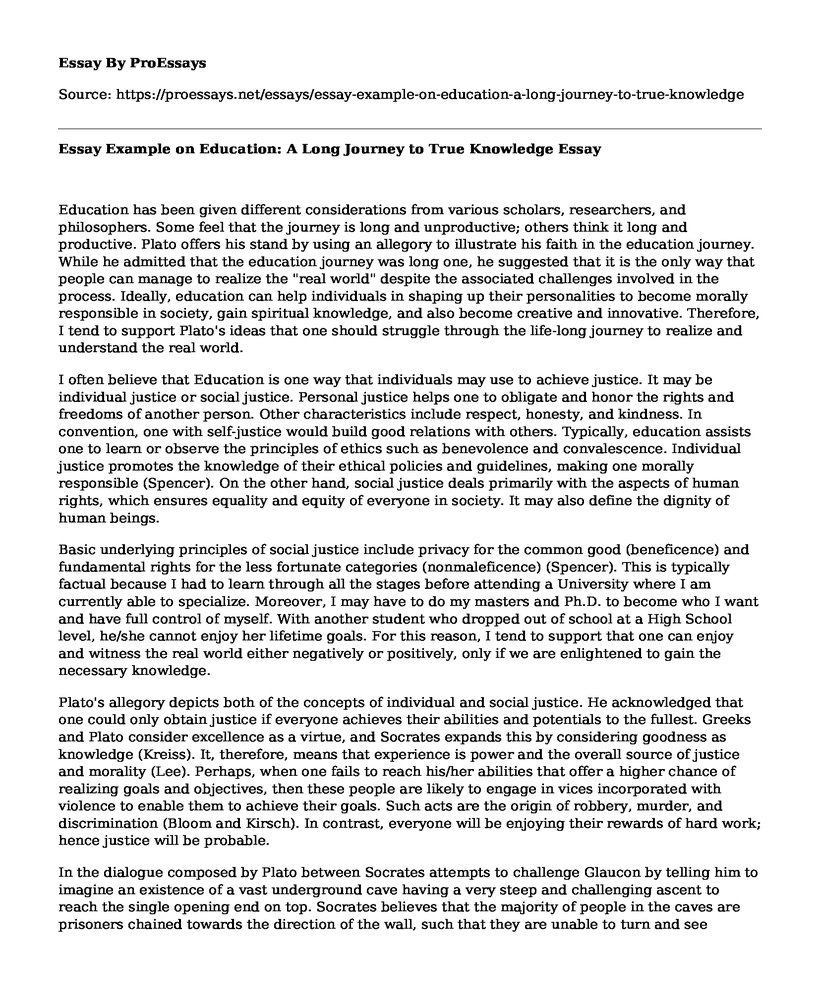Education has been given different considerations from various scholars, researchers, and philosophers. Some feel that the journey is long and unproductive; others think it long and productive. Plato offers his stand by using an allegory to illustrate his faith in the education journey. While he admitted that the education journey was long one, he suggested that it is the only way that people can manage to realize the "real world" despite the associated challenges involved in the process. Ideally, education can help individuals in shaping up their personalities to become morally responsible in society, gain spiritual knowledge, and also become creative and innovative. Therefore, I tend to support Plato's ideas that one should struggle through the life-long journey to realize and understand the real world.
I often believe that Education is one way that individuals may use to achieve justice. It may be individual justice or social justice. Personal justice helps one to obligate and honor the rights and freedoms of another person. Other characteristics include respect, honesty, and kindness. In convention, one with self-justice would build good relations with others. Typically, education assists one to learn or observe the principles of ethics such as benevolence and convalescence. Individual justice promotes the knowledge of their ethical policies and guidelines, making one morally responsible (Spencer). On the other hand, social justice deals primarily with the aspects of human rights, which ensures equality and equity of everyone in society. It may also define the dignity of human beings.
Basic underlying principles of social justice include privacy for the common good (beneficence) and fundamental rights for the less fortunate categories (nonmaleficence) (Spencer). This is typically factual because I had to learn through all the stages before attending a University where I am currently able to specialize. Moreover, I may have to do my masters and Ph.D. to become who I want and have full control of myself. With another student who dropped out of school at a High School level, he/she cannot enjoy her lifetime goals. For this reason, I tend to support that one can enjoy and witness the real world either negatively or positively, only if we are enlightened to gain the necessary knowledge.
Plato's allegory depicts both of the concepts of individual and social justice. He acknowledged that one could only obtain justice if everyone achieves their abilities and potentials to the fullest. Greeks and Plato consider excellence as a virtue, and Socrates expands this by considering goodness as knowledge (Kreiss). It, therefore, means that experience is power and the overall source of justice and morality (Lee). Perhaps, when one fails to reach his/her abilities that offer a higher chance of realizing goals and objectives, then these people are likely to engage in vices incorporated with violence to enable them to achieve their goals. Such acts are the origin of robbery, murder, and discrimination (Bloom and Kirsch). In contrast, everyone will be enjoying their rewards of hard work; hence justice will be probable.
In the dialogue composed by Plato between Socrates attempts to challenge Glaucon by telling him to imagine an existence of a vast underground cave having a very steep and challenging ascent to reach the single opening end on top. Socrates believes that the majority of people in the caves are prisoners chained towards the direction of the wall, such that they are unable to turn and see anything around them. Excitingly, the vital theme depicted in Plato's allegory using the cave is the perceptions of real knowledge or rather the actual world (Bloom and Kirsch). The dialogue is used to appreciate that humans can only gain practical experience through philosophical reasoning and thoughts (Kreiss). Whoever is outside the cave can view and witness the activities of the real world, whereas this is not possible for the prisoners who can only see their shadows.
Conclusion
This discussion has provided an evidence-based approach to the importance of acquiring knowledge, as it is the most critical tool to realize the benefits of the real world. People should, therefore, adapt to the long journey of education, to have the knowledge, which can help promote justice, fairness in their real-world of comforts and reasonings. In support, Socrates says that the prisoners have to ascend upwards from the cave, despite the difficulties for them to realize the real world. For this reason, human beings should avoid ignorance, and step up to acquire education to achieve the suggested tremendous rewards, mentality, and spirituality present in the real world.
Works cited
Bloom, Allan, and Adam Kirsch. The republic of Plato. Basic Books, 2016.
Kreiss. "Plato, The Allegory of the Cave." 2000, www.historyguide.org/intellect/allegory.html.
Lee, Myungjoon. "Plato's philosophy of education: Its implication for current education." (1994).
Spencer, Herbert. The principles of ethics. Vol. 1. D. Appleton and company, 1892.
Cite this page
Essay Example on Education: A Long Journey to True Knowledge. (2023, May 23). Retrieved from https://proessays.net/essays/essay-example-on-education-a-long-journey-to-true-knowledge
If you are the original author of this essay and no longer wish to have it published on the ProEssays website, please click below to request its removal:
- Essay Example on Integrating Technology in Early Literacy
- Creativity in the Classroom Essay
- Impact of School Resources on Learning Essay
- Online Classroom Is Better Than Traditional Classroom Essay
- Personal Statement for Nursing Practitioner Program Paper Example
- Essay Sample on Teachers Struggle With Indiscipline Cases
- Application Essay for Scholarship to Study Engineering Management







